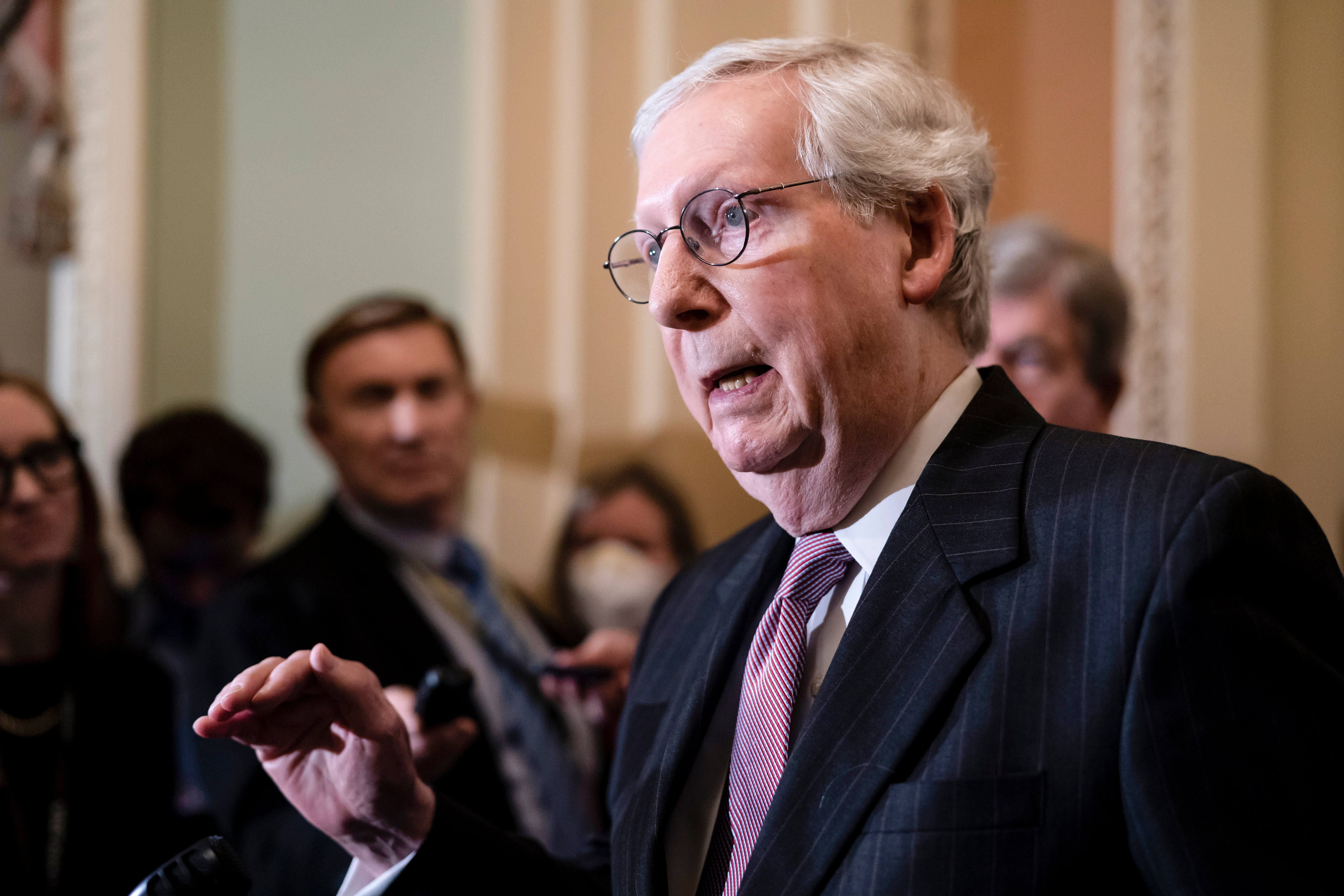Senate readies final congressional OK of $40B Ukraine aid
A $40 billion infusion of military and economic aid for Ukraine and its allies is advancing to the cusp of Senate passage

Your support helps us to tell the story
From reproductive rights to climate change to Big Tech, The Independent is on the ground when the story is developing. Whether it's investigating the financials of Elon Musk's pro-Trump PAC or producing our latest documentary, 'The A Word', which shines a light on the American women fighting for reproductive rights, we know how important it is to parse out the facts from the messaging.
At such a critical moment in US history, we need reporters on the ground. Your donation allows us to keep sending journalists to speak to both sides of the story.
The Independent is trusted by Americans across the entire political spectrum. And unlike many other quality news outlets, we choose not to lock Americans out of our reporting and analysis with paywalls. We believe quality journalism should be available to everyone, paid for by those who can afford it.
Your support makes all the difference.A $40 billion infusion of military and economic aid for Ukraine and its allies was on the cusp of Senate passage Thursday as both parties rallied behind America's latest, and quite possibly not last, financial salvo against Russia's invasion.
Thursday's planned vote would give final congressional approval to the package, three weeks after President Joe Biden requested a smaller $33 billion version. The House approved it last week after beefing up its defense and humanitarian expenditures, and Senate passage was not in doubt, though a modest group of America First-minded Republicans was expected to vote “no.”
Biden's quick signature was certain as Russia's attack, which has mauled Ukraine's forces and cities, slogs into a fourth month with no obvious end ahead. That means more casualties and destruction in Ukraine, which has relied heavily on U.S. and Western assistance for its survival, especially advanced arms, with requests for more aid potentially looming.
Senate Majority Leader Chuck Schumer, D-N.Y., said Wednesday he was not confident this would be the final measure to help Ukraine. “They're doing the fighting, they're the ones getting killed, they're the ones struggling and suffering. The least we can do is give them the weaponry they need," he said.
Senate Minority Leader Mitch McConnell, R-Ky., said Russian President Vladimir Putin's invasion is “a dangerous spark to be stamped out" before it succeeds or encourages other countries like China to launch attacks in their regions. Though he did not specifically address future aid for Ukraine, McConnell said countries should “stand shoulder to shoulder against authoritarian aggression” and said the U.S. must continue helping other allies upgrade their militaries.
Sen. Rand Paul, R-Ky., who's long had non-interventionist views, used procedural tactics to thwart Schumer and McConnell, who'd planned for Senate approval a week ago.
In a personal criticism seen seldom on the Senate floor, Schumer on Wednesday called Paul's move “repugnant" and said the delay, with passage inevitable, would “strengthen Putin's hand." McConnell, who last Saturday met with Ukrainian President Volodymyr Zelenskyy during a surprise visit to Kyiv, did not speak up in his fellow Kentucky Republican's defense.
In a brief interview, Paul responded that it would be “repugnant" to disparage “the democratic process" as embodied in Senate rules that he was using. He called Schumer's comments “callous and careless."
The legislation contains around $24 billion for weapons, equipment and military financing for Ukraine, restoring Pentagon stocks of arms sent to the region and paying for U.S. reinforcements sent there. The rest includes economic aid to keep Zelenskyy's government functioning, food programs for countries that rely on Ukraine's diminished crop production, refugee assistance and funds for Kyiv to investigate Russian war crimes.
With the November elections for control of Congress in full swing, former President Donald Trump has criticized the $40 billion plan. He's contrasted it with the current shortage of infant formula — over which the Biden administration has little control — and complained European allies are not contributing enough.
Such arguments have found traction with some — but not all — Trump-friendly Republicans in Congress.
“It’s, you know, the world’s going to end if you don’t do anything here," said Sen. Mike Braun, R-Ind., who said he would oppose the Ukraine measure. “I’m more worried about the trust fund going broke” that finances Medicare and another that pays for Social Security.
Braun said he's long pushed for bills that pay for themselves. Asked why saving $40 billion in this instance outweighed stopping Russia, he said, “Number one, it's going to pass.”
Another conservative, Sen. Ted Cruz, R-Texas, said that as costly as the measure is, the aid will protect U.S. national security and said, “If Putin wins, the consequences for America and American taxpayers will be hundreds of billions of dollars.”
Sen. Mitt Romney, R-Utah, a moderate who has clashed with Trump, said in an interview that helping Ukraine defend itself ”is about as smart an investment as we could possibly make.” He added, “What does America First mean? It means that we should first be concerned about the interests of America. I totally agree.”
The House approved the new bill last week by 368-57, with all “no” votes from Republicans. The Senate gave it preliminary approval Monday by 88-11, with all 11 opponents from the GOP, and Thursday’s final passage was expected to largely replicate that.
Congress approved an initial $13.6 billion measure in March. The combined price tag of nearly $54 billion exceeds what the U.S. spent on all its foreign and military aid in 2019, according to the nonpartisan Congressional Research Service.